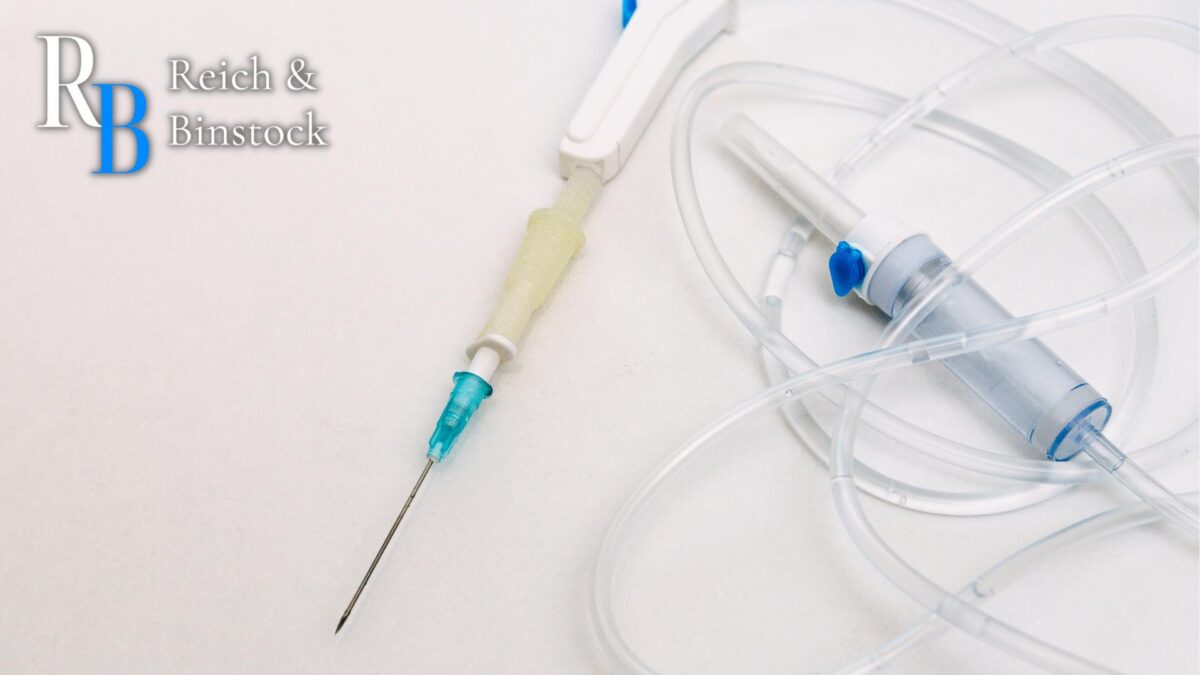When considering your legal options regarding the negative effects of Tepezza, understanding the duration it remains in your system is important. At Reich & Binstock, we want to help our clients be knowledgeable regarding all aspects of these potentially harmful drugs, especially if they have suffered adverse side effects, including hearing loss.
If you’ve been affected by the harmful side effects of Tepezza infusion treatment, you may be able to join countless others who have filed lawsuits against the manufacturer to receive compensation. To learn more about filing a Tepezza lawsuit, schedule a free consultation with the Houston defective drug attorneys by calling (713) 622-7271 today.
What Is Tepezza?
Tepezza, known generically as teprotumumab, is a medication approved by the FDA for treating Thyroid Eye Disease (TED). Tepezza is administered intravenously and works by targeting and inhibiting specific proteins involved in the inflammatory process, reducing the severity of these symptoms and providing relief for those suffering from active thyroid eye disease.
Since Tepezza is administered intravenously, patients will receive treatment at a hospital or infusion center. Administering infusion medicines is challenging, and only a Tepezza infusion nurse or other licensed healthcare professional should conduct treatment.
What Is Tepezza Used to Treat?

Tepezza treats Thyroid Eye Disease (TED), a condition often associated with Graves’ disease. TED is an autoimmune disorder where the immune system mistakenly attacks the tissues around the eyes, leading to inflammation, swelling, and a host of uncomfortable and potentially debilitating symptoms.
Symptoms of thyroid eye disease include eye bulging (proptosis), double vision (diplopia), redness, and pain, which can impact a patient’s quality of life and, in severe cases, lead to vision impairment.
Tepezza Is Used to Treat Thyroid Eye Disease
Tepezza treats thyroid eye disease by disabling the specific protein known as the insulin-like growth factor 1 receptor (IGF-1R). IGF-1R plays an important role in the development and progression of TED.
When Tepezza binds to IGF-1R, it interferes with the signaling pathway, leading to inflammation and tissue changes in the eye area. By inhibiting this pathway, Tepezza reduces the inflammation, swelling, and other symptoms associated with TED. This can lead to improved eye appearance, reduced eye bulging, and relief from other symptoms.
While Tepezza treatment has provided relief for those suffering from TED, there have been reports of patients experiencing adverse reactions. If you’re starting Tepezza treatment or have started the Tepezza infusion process, it’s important to be familiar with the negative side effects associated with this drug. Some have experienced a mild allergic reaction, while others have had a severe allergic reaction.
How Long Does Tepezza Treatment Take to Work?
The time it takes for patients to notice improvements during their Tepezza treatment will vary, but many begin to see a difference within several weeks. The full course of Tepezza involves eight infusions given every three weeks.
Some patients report experiencing noticeable changes in symptoms like reduced swelling or less eye bulging after the initial few doses. However, the total duration of noticing significant improvements can differ based on the severity of the condition and individual response to the treatment.
What Are the Side Effects of Tepezza?
Tepezza, like all prescription drugs, can cause side effects, although not everyone will experience them. Some of the more commonly reported side effects of Tepezza include:
- Muscle Spasms: Patients may experience muscle cramps or spasms, particularly in their legs.
- Nausea and Diarrhea: Gastrointestinal issues such as inflammatory bowel disease, nausea, and diarrhea are common.
- Hair Loss: Some patients might notice thinning or hair loss during treatment.
- Fatigue: A lack of energy or feeling of tiredness is frequently reported.
- Increased Blood Sugar: Tepezza can cause high blood sugar levels, which is particularly important for patients with diabetes to monitor.
- Dry Skin: The skin may become dry and may require moisturizing treatments.
- Headache: Some people may experience headaches while undergoing treatment with Tepezza.
- Infusion Reactions: Patients may experience a mild to severe infusion reaction, such as flushing, headache, or feeling hot, which can occur usually during or shortly after the infusion.
What Are the Bad Side Effects of Tepezza?
While Tepezza offers significant benefits in managing thyroid eye disease symptoms, understanding its possible severe side effects is important when deciding on treatment and understanding your legal options.
Tinnitus
One serious side effect of Tepezza treatment is tinnitus, an auditory issue characterized by the perception of ringing or noise in the ears in the absence of external sound. Tinnitus can manifest as ringing, buzzing, or hissing sounds and has been noted in some patients undergoing treatment with Tepezza for thyroid eye disease.
The impact of tinnitus can vary in pitch and intensity. While it is usually a temporary side effect, it can be bothersome, causing distractions, sleep disturbances, and affecting overall quality of life.
Hearing Loss
Hearing loss is another concerning negative side effect in some patients treated with Tepezza for thyroid eye disease. This auditory complication can range from mild to severe and may manifest as a reduced ability to hear sounds, difficulties in understanding speech, or a sense of muffled hearing.
The onset of hearing loss associated with Tepezza can vary, and its duration may depend on individual factors and the overall treatment regimen. Patients experiencing this symptom are advised to consult their healthcare providers promptly.
Are Tepezza Side Effects Permanent?

Generally, most side effects of Tepezza, such as muscle spasms, nausea, or hair loss, are temporary and often resolve after the treatment is completed or adjusted. However, there have been instances where certain side effects, like hearing impairment or high blood sugar levels, may persist longer or have lasting impacts. It’s important to note that the continuation of side effects can vary among individuals, influenced by factors like personal health history and the severity of the underlying condition.
What Is the Half-Life of a Medication?
The half-life of a medication is a pharmacological term that refers to the time it takes for the drug in the bloodstream to reduce to half of its initial value. This measure is crucial in understanding how long a drug remains active and effective in the body, and it influences how often the medication needs to be given to maintain its effect.
The half-life can vary greatly between medicines, ranging from a few hours to several days. It is influenced by factors such as the drug’s chemical properties, how the body metabolizes it, and individual patient characteristics like age, liver, and kidney function.
What Is the Half-Life of Tepezza?
The half-life of Tepezza is approximately 20 days, meaning it takes around 20 days for the drug in the bloodstream to reduce to half of its initial level. This relatively long half-life allows for the drug to be administered at intervals, typically as an intravenous infusion every three weeks, over the course of eight infusions.
When Should You Talk With Your Doctor About Tepezza Side Effects?

It is essential to talk with your doctor about any side effects you experience while undergoing Tepezza treatment for thyroid eye disease. Prompt discussion is particularly important if you notice any new or worsening symptoms, such as hearing changes, vision problems, muscle spasms, or significant changes in blood sugar levels, especially if these effects impact your daily life or cause discomfort.
Since Tepezza can have a range of side effects, from mild to severe, keeping your healthcare provider informed allows for timely intervention, such as adjusting the dosage or treatment schedule or introducing measures to alleviate the side effects.
If you have pre-existing health conditions, like diabetes, which could be affected by Tepezza, regular consultation becomes even more crucial. It’s also important to notify your doctor of the medications you’re taking, as Tepezza may have adverse drug interactions. Women considering Tepezza will need to take birth control during the duration of their treatment. Open and ongoing communication with your doctor ensures that your treatment for TED is as effective and safe as possible.
Contact a Tepezza Lawsuit Attorney with Reich & Binstock
If you have experienced significant side effects or complications from Tepezza treatment, it may be time to consider legal action. Our experienced team of defective drug attorneys specializes in handling cases related to adverse drug reactions and is well-versed in the complexities of pharmaceutical litigation.
We are committed to providing personalized legal guidance and support, ensuring that your case is handled with the utmost care and professionalism. Call Reich & Binstock at (713) 622-7271 for a free Tepezza consultation today.














